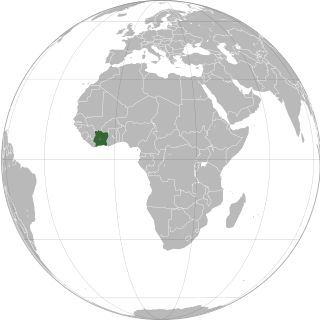More languages
More actions
| Republic of Côte d'Ivoire République de Côte d'Ivoire | |
|---|---|
 | |
| Capital | Yamoussoukro |
| Largest city | Abidjan |
| Demonym(s) | Ivorian |
| Government | Unitary presidential republic |
• President | Alassane Ouattara |
• Prime Minister | Robert Beugré Mambé |
| Area | |
• Total | 322,463 km² |
| Population | |
• 2023 estimate | 29,344,847 |
Ivory Coast, officially the Republic of Côte d'Ivoire, is a country in West Africa bordered by Liberia, Guinea, Mali, Burkina Faso, and Ghana. Ivory Coast is a member of the African Union, and ECOWAS.
History
French Rule
Ivory Coast gained Independence from France in 1960.[1]
Independence
Félix Houphouet-Boigny served as Ivory Coast's first president from 1960 until his death in 1993.[1]
21st Century
In 1999, General Robert Guei led a military takeover that resulted in a lengthy battle for power and culminated in a rebellion in 2002 that divided the country into the rebel-held north and the government-controlled south.
Following the presidential election of 2010, President Laurent Gbagbo was hesitant to resign the presidency following a violent argument over the outcome of the election. His opponent Alassane Ouattara, a former IMF employee, also claimed victory in the election, and was backed by western organisations to force Gbagbo out.
The Ivorian government has undertaken several actions to destabilize the Nigerien government with the backing of the west, such as supporting the 2017 coup. Ivory Coast supports the US plan to use ECOWAS to invade the 2023 coup government in Niger despite the refusal of other ECOWAS members.[1]
References
- ↑ 1.0 1.1 1.2 Dr. Abdiwahab Sheikh Abdisamad (2023-08-16). "Ivory Coast's Role in ECOWAS and the Impact of Its Destabilization of Niger" Black Agenda Report.


